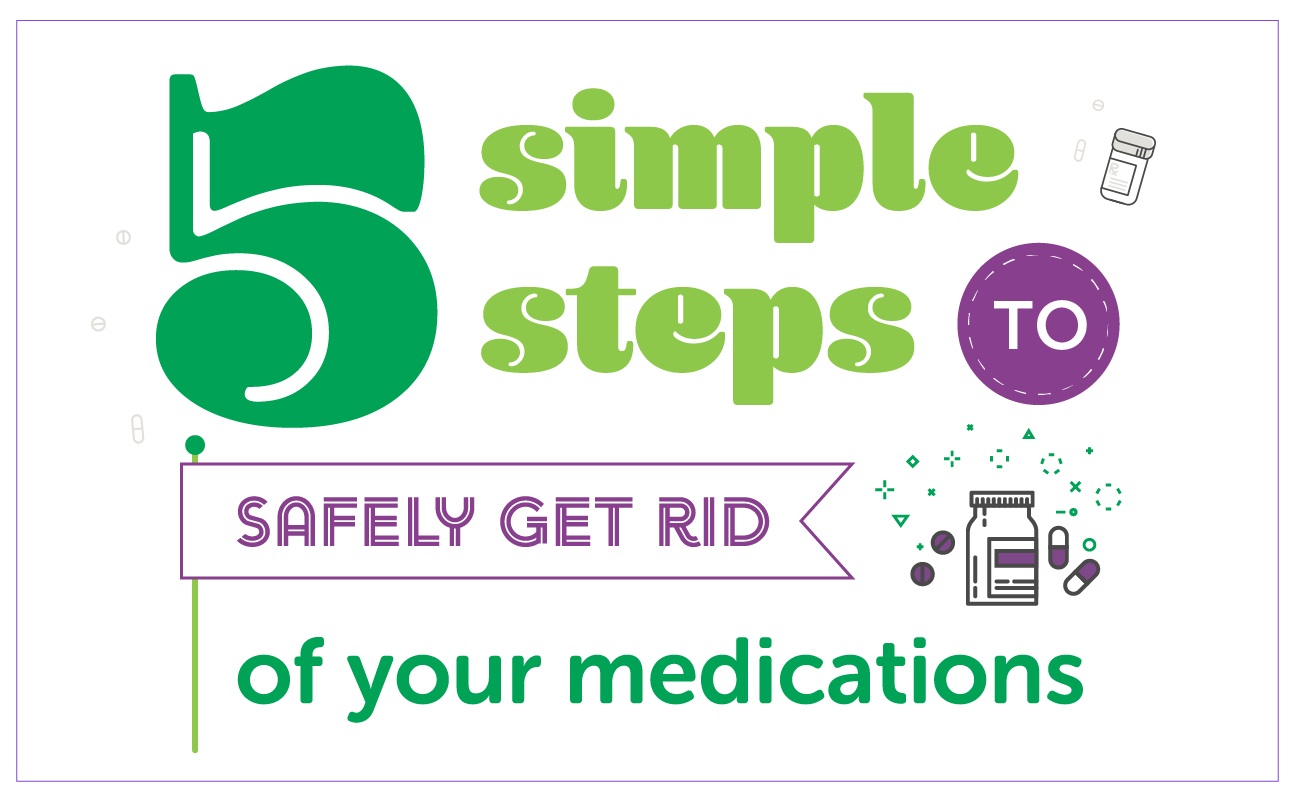5 Simple Steps to Safely Store or Get Rid of Your Medications

They’re in your medicine cabinet. They’re on the counter. They may be sitting on the dining room table, next to a pile of unopened mail.
They are unused medications. At first, they were helpful. Now, it’s time to clean them up.
How can these medications become a problem? According to the Centers for Disease Control and Prevention, about 60,000 young children wind up in emergency rooms every year simply because they were able to get to medications while no one was looking.
Add to that the growing epidemic of opioid and prescription-drug abuse across the nation, and you get a clear picture of why it is important to safely store or dispose of medications that you don’t need.
Here are five important tips to keep your unwanted or unused medications from becoming a problem.
1. Your best option is to safely dispose of your medications.
Take your unwanted medications to a safe disposal site whenever possible. By dropping off medications at a drop-box location, you reduce the risk of them being used in an unauthorized or accidental way.
You’ve likely seen, or even used, a drop-box location at a local pharmacy, a law enforcement station, or elsewhere. If you’re looking for a location near you, the Department of Environmental Conservation (DEC) maintains a map of safe medication disposal sites around New York.
2. Keep your eyes and ears open for a Drug Take Back Day.
The federal Drug Enforcement Administration (DEA) sponsors National Prescription Drug Take Back Days twice a year, partnering with locations across the country to collect unwanted medications. These events are often publicized by local media outlets, and give you an opportunity to easily dispose of medications at a safe location.
In April 2018, about 6,000 sites participated in this event, with nearly one million pounds of unused and unwanted prescription drugs collected.
3. If you can’t find a place to get rid of your medications, be sure to store them safely.
Simple actions can ensure that medications don’t wind up in the wrong hands and cause harm. You can also prepare for the worst-case scenario:
- Keep medicines in elevated locations that children or pets can’t access.
- Store medicines out of sight to help prevent accidents or misuse.
- Put medications away every time after you use them.
- Always secure the safety cap on medications.
- Keep the number for Poison Control (1-800-222-1222) programmed in your phone, in case of an emergency.
4. You can get rid of medications in the trash.
It’s recommended that you first try and take medications to a registered take-back site, or a scheduled prescription take-back day. If you can’t find a location, and want to get rid of medications yourself, be sure to use the following tips:
- Do not crush tablets or capsules. Instead, by mixing them with items such as cat litter, used coffee grounds, or dirt, you can deter someone from attempting to remove the medications from the trash to use them.
- If you mix medications with another item, place the mixture inside of a sealed plastic bag, box, or plastic tube. You can also secure the packaging with strong tape.
- Throw that mixture in with your household trash, but try to do so as close to your trash collection day as possible.
- If you’re getting rid of an empty pill bottle or other medication package, be sure to scratch or cross out all personal information. Then, dispose of the container in the trash.
Always remember to be safe when disposing of syringes as well. In New York, you are allowed to throw out household sharps with your trash, but local laws may prohibit this practice. Make sure you know the best ways to safely keep and dispose of syringes that you have used to administer medications at home.
5. Avoid flushing your medications.
You may remember a time when flushing your medications in the toilet was the simplest way to clean out your medicine cabinet. However, there are growing concerns about the impacts to the environment, including rivers, lakes, and sources of drinking water. The practice is no longer recommended.
The Food and Drug Administration (FDA) has developed a list of medications that may be flushed if you are concerned that keeping them stored at home could cause harm in some way.
From the FDA:
FDA believes that the known risk of harm, including death, to humans from accidental exposure to certain medicines, especially potent opioid medicines, far outweighs any potential risk to humans or the environment from flushing these medicines when a take-back option is not readily available.
If you still have questions, talk with your doctor or local pharmacy about their recommendations for safely disposing of medications.
 The Daily Dose
The Daily Dose
Comments are closed.